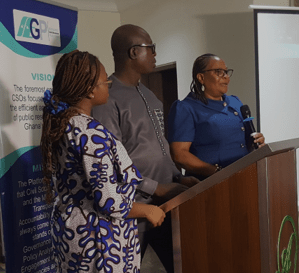By Buertey Francis BORYOR
The Coordinator of the Economic Governance Platform (EGP), Abdul-Karim Mohammed, has called for the strengthening of the Auditor-General’s mandate to curb financial mismanagement and enhance accountability in the country.
Speaking at the launch of the CSOs Online Public Debt Tracker and Dashboard on IMF Bailout in Accra, he said the country’s frequent reliance on the Bretton Woods Institution support is a direct result of poor fiscal discipline.
“The nation keeps seeking support from the IMF because of how public resources are managed. The Auditor-General’s reports show that every year, a lot of money is lost due to resources unaccounted for. Until we strengthen this mandate, we will continue to lose money that could have been used for national development,” he elaborated.
Mr. Mohammed also underscored the need for Parliament to take a step in government spending. According to him, while Parliament is expected to check government spending, the executive often makes financial decisions with little resistance.
The launch of the Public Debt Tracker, he said, was aimed at helping citizens understand the nation’s debt situation. He added that many people do not know how much the country owes and how it affects them.
“When you break down the numbers, every citizen owes over GH¢21,000. Some people have never seen that amount of money in their lives, yet they suffer from the effects of economic mismanagement,” he said.
Another part of the initiative is the IMF Bailout Dashboard, which will track the nation’s 17th IMF programme. The aim is to give the public easy access to important economic information.
“Borrowing is not bad, but the problem is when we use loans to pay for everyday expenses instead of investing in projects that can bring in money,” he said.
Mr. Karim encouraged civil society and the media to use the tracker to ask government officials the right questions and hold them accountable.
He also urged citizens to pay attention to the nation’s debt situation and demand answers from the central bank, the Finance Ministry and Parliament.
The initiative is supported by Oxfam and the Open Society Foundation.
Meanwhile, Executive Director of the Ghana Integrity Initiative (GII), Mrs. Mary Awelana Addah, said civil society is taking the lead in promoting transparency through the creation of the IMF Dashboard and the Debt Tracker.
She noted that the credibility of the platform has not been contested, making it a reliable source of information.
Mrs. Addah, therefore, encouraged journalists to use the platform for their reporting and urged citizens to take advantage of the data to advocate for better financial management.
She added that the information provided will help track the progress of the IMF programme and monitor the nation’s debt under the new government. She further assured that GII will continue using the data to push for better fiscal governance and sustainable debt management.
Also, Fiscal Policy Advisor at Oxfam, Angela Azumah Alu, reaffirmed Oxfam’s commitment to supporting initiatives that enhance financial transparency and accountability.
She added that Oxfam recognises the importance of the Public Debt Tracker and IMF Dashboard in helping citizens understand economic policies and debt management. She also stressed that access to clear and accurate financial data empowers the public to engage policy-makers effectively and demand responsible governance.
Furthermore, she said Oxfam will continue working with civil society organisations to ensure that the platform remains a valuable tool in promoting fiscal responsibility.










